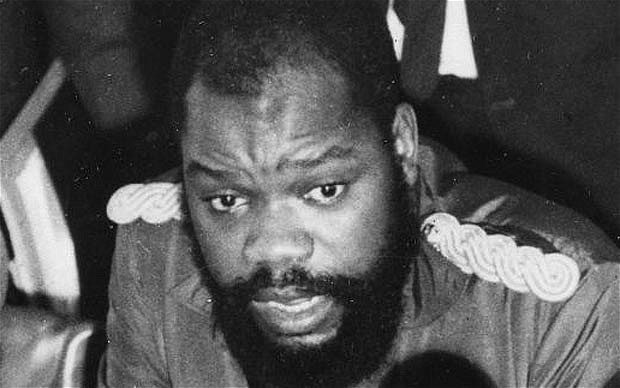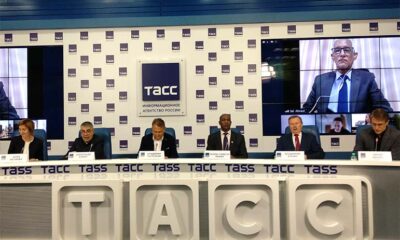Forgotten Dairies
Reflections On Chukwuemeka Odumegwu-Ojukwu At 88 -By Henry Chukwuemeka Onyema
Why can we not sit round and discuss? Discussing doesn’t take power away from anybody. Because you either accept or you reject. But as a nation, we must get down and make sure we are all speaking the same language.’

Let the title not fool anyone, especially younger readers. Chukwuemeka Odumegwu-Ojukwu died on 26 November 2011 at the age of 78. What I am doing here is to reflect on the man and his legacies as the date of his birthday draws close.
This is even more significant given the state of anomie in his core constituency, Igboland, and his home state of Anambra. November has a covenant with Odumegwu-Ojukwu for he was born on November 4 1933 and died on 26 November.
First, that emotive word which by no account belongs to Odumegwu-Ojukwu but with which he will always be associated till this earth and heaven pass away: Biafra. In this day and age millions of Igbo and Eastern Nigerians at home and in the Diaspora see Biafra as the solution to all their woes; their definitive identity; the line in the sand that defines their destiny; an answer to all kinds of prayer. Agreed, there are significant exceptions just as they existed when Odumegwu-Ojukwu made that fateful broadcast on 30 May 1967 formally declaring Eastern Nigeria the republic of Biafra. But while the circumstances that led to that declaration can be debated forever, the historical facts cannot be ignored. The declaration of Biafra was the last alternative for Ojukwu, who many critics conveniently forget was a one-Nigerian man who started his working life seeking to work in Northern Nigeria instead of the East as a civil servant and only learnt his native Igbo language and culture AFTER acquiring versatility in English, Yoruba and Hausa by virtue of his upbringing outside the East. The nature of this article does not allow me to cite sources on how Ojukwu came close to collision with many significant state and non-state actors because he held out on some chance of preventing a break-up.
However, the buck stopped at his table as the governor of the old Eastern region. In the light of the war that followed the secession and what Eastern Nigerians, especially the Igbo, have been going through since the war ended in 1970, did he take the right decision? Why did he not accept the 12-state structure imposed on Nigeria by the Yakubu Gowon regime on 27 May 1967? The likes of super-permanent secretary, Allison Ayida who was Ojukwu’s contemporary at Oxford University, argue that the Decree no. 8 promulgated by the Gowon regime in the wake of the controversial interpretations of the outcomes of the Aburi talks gave Ojukwu virtually what he wanted: a confederation. Maybe, but what was it about the Aburi Accord which both sides willingly and freely agreed on that made Gowon fashion the decree without consulting Ojukwu and establishing the twelve states which was not discussed at Aburi?
Perhaps what makes Ojukwu such an icon despite what Biafra brought to Eastern Nigerians is his absolute commitment to the project and its people: a commitment that cost him his all, well almost, since he lived to tell the tale. I am waiting for the day a rock-solid historical record will emerge to show how Ojukwu, either as governor of the Eastern region, or Biafra’s leader, helped himself to public funds under any justification. In his last speech to Biafrans after he left for Ivory Coast to seek for peaceful resolution of the conflict (which is a simple untruth in my book: the fact is that Ojukwu was prevailed upon to remove himself from the scene because it was obvious Biafra was on her last legs, and chances of the victorious Federal forces unleashing massive mayhem if the symbol of what Gowon called the ‘Nnewi clique’ remained behind to foolishly fight on would be reduced by his exit) said: ‘….whilst I live Biafra lives. If I am no more it would be only a matter of time for the noble concept to be swept in oblivion.’ Another untruth in my book because Biafra still lives in the hearts of millions from that part of the world where the physical Biafra existed; including many whom never saw the civil war.
Odumegwu-Ojukwu’s post-civil war years, especially after his exile, may not have been glorious in the eyes of many, especially those who still saw him as the young hot-blooded rebel. But any honest reflection on him on the eve of his posthumous eighty-eighth birthday is incomplete without looking at Ojukwu the sage and leader of his people.
In 1997, on the eve of the 30th anniversary of the declaration of Biafra, Ojukwu was interviewed by journalists Comfort Obi and Maik Nwosu of ‘The Source’ magazine. The former Biafran leader talked about a gathering he hosted in Enugu and during opening prayers, he appealed to the good Lord to give Igbo people madmen. According to him ‘ ndi-Igbo were becoming too sane, grumbling like women’ and doing nothing about their lot in Nigeria. ‘You are not human if you are angry and do not let people know you are angry,’ he concluded. One can conclude that God answered his prayer with Nnamdi Kanu and IPOB. Yet, it is the same Ojukwu who, well before the clamour for restructuring became fashionable in post-1970 Nigeria, solicited a national conference. These are his words from a 1992 interview with the defunct but unforgettable ‘Newswatch’ magazine: ‘…my brothers, why can we not have a Nigerian idea?
Why can we not sit round and discuss? Discussing doesn’t take power away from anybody. Because you either accept or you reject. But as a nation, we must get down and make sure we are all speaking the same language.’
In his book ‘Because I am Involved’ Ojukwu was realistic on the issues surrounding Nigeria’s unity. He argued that if we Nigerians sincerely felt that a genuine federal structure that submerged our primordial inclinations was not the way to go, we could go the confederal route of self-governing units and still attain well-being in our respective entities. In the wake of the current situation in Nigeria, that may be the way to go. Today (30 October 2021) I read a report in ‘Saturday Sun’ newspaper that some Northern elders filed a suit in the Abuja division of the federal high court to compel the National Assembly to remove the South-East geopolitical zone from Nigeria before the ongoing constutional amendment ends. Their suit is informed by the alleged violence being bankrolled by IPOB and the group’s desire to avoid another civil war. While the matter undergoes the judicial process, I ask myself: what is so sacrosanct about this skewered federalism in Nigeria that the National Assembly cannot modify our constitution to give us a confederation, probably based on the geopolitical zones? Interestingly while the six geopolitical zones of Nigeria are administrative and political realities of life in the country, the constitution does not recognize them. Late Alex Ekwueme, an Igbo and former Vice-President under Shehu Shagari, canvassed for the zones during the maligned 1994/95 national conference organized by Sani Abacha’s regime. As Northern delegates hectored Ekwueme when he was speaking, fellow conference delegate and also contemporary at King’s College, Lagos, Ojukwu himself, stood behind him and said to him, ‘Go on, speak.’
As hearts beat with trepidation over the Anambra State elections I wonder what Ojukwu would have said or done about the matter. Maybe infirmities of age might have kept him out of the fray but since he, till his death, loved his people to the end and ardently believed in democracy, might have reached out to both the federal government and Kanu and IPOB. Would they have moderated their positions? No idea, but of one thing I am sure: the Ikemba Nnewi would censure any charades associated with the elections, including its organization by INEC, and any bid to suppress the people’s true yearnings, but he would not say the election should not hold. Interestingly Nnamdi Kanu’s lawyer, Barrister Ejimofor, reported that his client never said the election should not hold. So who is organizing the sit-at-home to stop the election; who is behind the violence in Anambra state?
Let all Nigerians draw from Odumegwu-Ojukwu’s legacies.
Henry Chukwuemeka Onyema is a historian, author and teacher. Email: henrykd2009@yahoo.com.










